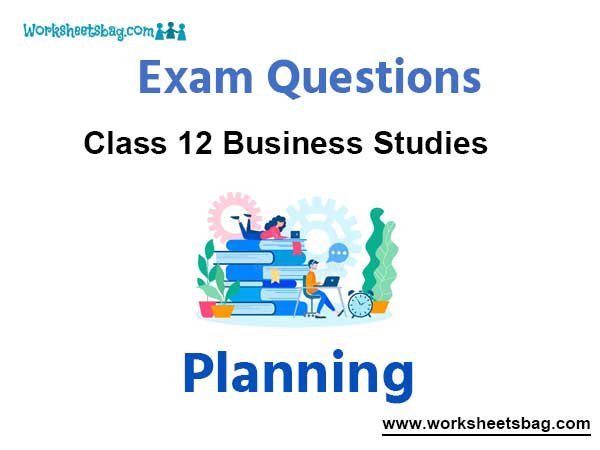Please see Chapter 4 Planning Exam Questions Class 12 Business Studies below. These important questions with solutions have been prepared based on the latest examination guidelines and syllabus issued by CBSE, NCERT, and KVS. We have provided Class 12 Business Studies Questions and answers for all chapters in your NCERT Book for Class 12 Business Studies . These solved problems for Planning in Class 12 Business Studies will help you to score more marks in upcoming examinations.
Exam Questions Chapter 4 Planning Class 12 Business Studies
Question: State any three limitations of planning.
Answer: Following are the three limitations of planning:
- Planning creates rigidity: It is difficult to make changes in planning. It does not permit New way of doing, once the plan is implemented.
- Planning does not work in a dynamic environment: Since future is uncertain and dynamic , the future anticipation through planning are not always true.
- Planning involves huge cost: Planning is a small work but its process is really big. So many people including the planning experts remain busy in the planning activity. The organisation is bound to face huge cost.
Question: What is meant by ‘Planning’? List any two features of planning.
Answer: Planning refers to thinking before doing. Under this it is decided- what is to be done, how it is to be done, when it is to be done and by whom it is to be done.
Features:
- It focuses on achieving objectives.
- It is primary function of management.
Question: Explain the steps involved in the process of planning.
Answer: Following are the steps included in planning:
- Setting Objectives: objectives are determined and defined first of all.
- Developing Premises: At this stage planning premises are developed. They affect the possible results of various alternates.
- Identifying Alternative Course of Action: On the basis of the objectives of the organisation and limitations of planning, alternative courses of doing a particular work can be discovered.
- Evaluating Alternative Courses: At this stage, it is seen as to what extent a particular alternative course can help in the attainment of objectives of the organisation.
- Selecting of Alternative: After careful analysis, the best alternative is selected.
- Implementing the Plan: The next step is to implement the chief and subsidiary plans.
- Follow up Action: In the end, there is a constant review of plans so as to ensure success in the uncertain future
Question: A company is manufacturing garments. The manager wants to increase profits by purchasing new high speed machines or increasing the sale price or using waste materials in manufacturing stuffed toys. He decided that “using waste material” is the best solution for him.
(a) Identify the concept of management involved.
(b) Mention any two steps involved in the above process by quoting the lines from the question.
Answer: (a) The concept of management involved here is “Planning”.
(b) Two steps involved are-
(i) the manager wants to increase profits – Setting up of the objectives.
(ii) He decided that “using waste material” is the best solution for him – Selecting an alternative.
Question: How does planning provide direction?
Answer: Under the process of planning the objectives of the organisation are defined in simple and clear words. The obvious outcome of this is that all the employees get a direction and all their efforts are focused towards a particular end. In this way, planning has an important role in the attainment of the objectives of the organisation.

